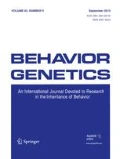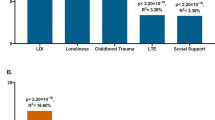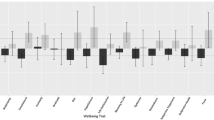Abstract
Although stress is frequently considered an environmental factor, dependent stressful life events (SLEs)––stressors that result from one’s actions or behaviors––may in fact be evoked by a genetic liability. It has been suggested that dependent SLEs may be partially caused by poor executive function (EFs), higher-level cognitive abilities that enable individuals to implement goal-directed behavior. We investigated the possibility of genetic and environmental overlap between SLEs and EFs in a longitudinal twin study. We found high genetic stability in the number of dependent SLEs from age 23 to age 29, suggesting that the number of dependent stressors show persistence across time due to their genetic etiology. In addition, there was a nominally significant negative genetic correlation between a Common EF latent factor and dependent SLEs at age 23. The genetic stability of dependent SLEs and association with Common EF provides insight into how some behaviors may lead to persistent stress.


Similar content being viewed by others
Notes
We used Eq. 15, which assumes that the correlations being compared are independent. Because these parameters were estimated in the same twin sample, they may covary slightly. However, when that covariance is positive, as would most likely be the case in this sample, the confidence interval for their difference becomes tighter. Thus, this may be a conservative estimate of the 95% confidence interval for their difference.
References
Bemmels HR, Burt A, Legrand LN, Iacono WG, McGue M (2008) The heritability of life events: an adolescent twin and adoption study. Twin Res Hum Genet 11(3):257–265. https://doi.org/10.1375/twin.11.3.257
Billig JP, Hershberger SL, Iacono WG, McGue M (1996) Life events and personality in late adolescence: genetic and environmental relations. Behav Genet 26(6):543–554. https://doi.org/10.1007/BF02361227
Billings AG, Moos RH (1982) Stressful life events and symptoms: a longitudinal model. Health Psychol 1(2):99–117. https://doi.org/10.1037/0278-6133.1.2.99
Boardman JD, Alexander KB, Stallings MC (2011) Stressful life events and depression among adolescent twin pairs. Biodemography Social Biology 57(1):53–66. https://doi.org/10.1080/19485565.2011.574565
Briley DA, Tucker-Drob EM (2017). Comparing the developmental genetics of cognition and personality over the life span. J Pers 85(1): 51–64. https://doi.org/10.1111/jopy.12186
Cohen S, Tyrrell DAJ, Smith AP (1993) Negative life events, perceived stress, negative affect, and susceptibility to the common cold. J Pers Soc Psychol 64(1):131–140. https://doi.org/10.1037/0022-3514.64.1.131
Colodro-Conde L, Couvy-Duchesne B, Zhu G, Coventry WL, Byrne EM, Gordon S, Montgomery GW (2018) A direct test of the diathesis—stress model for depression. Nature 23:1590–1596. https://doi.org/10.1038/mp.2017.130
Conway CC, Hammen C, Brennan PA (2012) Expanding stress generation theory: test of a transdiagnostic model. J Abnorm Psychol 121(3):754–766. https://doi.org/10.1037/a0027457
Corley R, Reynolds C, Wadsworth S, Rhea S, Hewitt J (2019) The colorado twin registry: 2019 update. Twin Res Hum Genet 22:707–715. https://doi.org/10.1017/thg.2019.50
Dohrenwend BS, Krasnoff L, Askenasy AR, Dohrenwend BP (1978) Exemplification of a method for scaling life events: the PERI Life Events Scale. J Health Soc Behav 19(2):205–229. https://doi.org/10.2307/2136536
Derks EM, Dolan CV, Boomsma DI (2004) Effects of censoring on parameter estimates and power in genetic modeling. Twin Res 7:659–669. https://doi.org/10.1375/1369052042663832
Eaton WW (1978) Life events, social supports, and psychiatric symptoms: a re-analysis of the New Haven data. J Health Soc Behav 19(2):230–234. https://doi.org/10.2307/2136537
Friedman NP, Miyake A (2017) Unity and diversity of executive functions: individual differences as a window on cognitive structure. Cortex 86:186–204. https://doi.org/10.1016/j.cortex.2016.04.023
Friedman NP, Miyake A, Young SE, Defries JC, Corley RP, Hewitt JK (2009) Individual differences in executive dunctions are almost entirely genetic in origin. J Exp Psychol 137(2):201–225. https://doi.org/10.1037/0096-3445.137.2.201
Friedman NP, Miyake A, Altamirano LJ, Corley RP, Young SE, Rhea SA, Hewitt JK (2016) Stability and change in executive function abilities from late adolescence to early adulthood: a longitudinal twin study. Dev Psychol 52(2):326–340. https://doi.org/10.1037/dev0000075
Hammen C (1991) Generation of stress in the course of unipolar depression. J Abnorm Psychol 100(4):555–561. https://doi.org/10.1037/0021-843X.100.4.555
Hammen C (2006) Stress generation in depression: reflections on origins, research, and future directions. J Clin Psychol 62(9):1065–1082. https://doi.org/10.1002/jclp.20293
Herd SA, O׳Reilly RC, Hazy TE, Chatham CH, Brant AM, Friedman NP (2014) A neural network model of individual differences in task switching abilities. Neuropsychologia 62:375–389. https://doi.org/10.1016/j.neuropsychologia.2014.04.014
Hu L, Bentler PM (1998) Fit indices in covariance structure modeling: sensitivity to underparameterized model misspecification. Psychol Methods 3:424–453. https://doi.org/10.1037/1082-989X.3.4.424
Kendler KS, Baker JH (2007) Genetic influences on measures of the environment: a systematic review. Psychol Med 37(5):615–626. https://doi.org/10.1017/S0033291706009524
Kendler KS, Karkowski LM, Prescott CA (1999) The assessment of dependence in the study of stressful life events: validation using a twin design. Psychol Med 29(6):1455–1460. https://doi.org/10.1017/S0033291798008198
Lupien S, McEwen BS, Gunnar MR, Heim C (2009) Effects of stress throughout the lifespan on the brain, behaviour and cognition. Nat Rev Neurosci 10(6):434–445. https://doi.org/10.1038/nrn2639
Muthén, L. K., & Muthén, B. O. (1998–2012). Mplus user’s guide. Seventh Edition. Los Angeles, CA: Author
Neale MC, Heath AC, Hewitt JK, Eaves LJ, Fulker DW (1989) Fitting genetic models with LISREL: hypothesis testing. Behav Genet 19:37–49
Nes RB, Røysamb E, Reichborn-Kjennerud T, Harris JR, Tambs K (2007) Symptoms of anxiety and depression in young adults: genetic and environmental influences on stability and change. Twin Res Hum Genet 10(3):450–461. https://doi.org/10.1375/twin.10.3.450
Plomin R, Lichtenstein P, Pedersen NL, McClearn GE, Nesselroade JR (1990) Genetic influence on life events during the last half of the life span. Psychol Aging 5(1):25–30. https://doi.org/10.1037/0882-7974.5.1.25
Posthuma D, Boomsma DI (2000) A note on the statistical power in extended twin designs. Behav Genet 30:147–158. https://doi.org/10.1023/A:1001959306025
Rebollo I, de Moor MHM, Dolan CV, Boomsma DI (2006) Phenotypic factor analysis of family data: correction of the bias due to dependency. Twin Res Hum Genet 9(3):367–376. https://doi.org/10.1375/twin.9.3.36
Reineberg AE, Gustavson DE, Benca C, Banich MT, Friedman NP (2018) The relationship between resting state network connectivity and individual differences in executive functions. Front Psychol 9:article 1600. https://doi.org/10.3389/fpsyg.2018.01600
Rhea S-A, Gross AA, Haberstick BC, Corley RP (2013) Colorado twin registry: an update. Twin Res Hum Genet 16(1):351–357. https://doi.org/10.1017/thg.2012.93
Rice F, Harold GT, Thapar A (2003) Negative life events as an account of age-related differences in the genetic aetiology of depression in childhood and adolescence. J Child Psychol Psychiatry 44(7):977–987. https://doi.org/10.1111/1469-7610.00182
Sarason IG, Jognson JH, Siegel JM (1978) Assessing the impact of life change: development of the life experience survey. J Consult Clin Psychol 46:932–946. https://doi.org/10.1037//0022-006x.46.5.932
Scarr S, Mccartney K (1983) How people make their own environments: a theory of genotype → environment effects. Child Dev 54(2):424–435. https://doi.org/10.2307/1129703
Silberg J, Rutter M, Neale M, Eaves L (2001) Genetic moderation of environmental risk for depression and anxiety in adolescent girls. Br J Psychiatry 179:116–121. https://doi.org/10.1192/bjp.179.2.116
Snyder HR, Hankin BL (2016) Spiraling out of control: stress generation and subsequent rumination mediate the link between poorer cognitive control and internalizing psychopathology. Clin Psychol Sci 4(6):1047–1064. https://doi.org/10.1177/2167702616633157
Snyder HR, Friedman NP, Hankin BL (2019) Transdiagnostic mechanisms of psychopathology in youth: executive functions, dependent stress, and rumination. Cogn Ther Res 43(5):834–851. https://doi.org/10.1007/s10608-019-10016-z
Sobolewski A, Strelau J, Zawadzki B (2001) The temperamental determinants of stressors as life changes. Eur Psychol 6(4):287–295. https://doi.org/10.1027//1016-9040.6.4.287
Williams PG, Suchy Y, Rau HK (2009) Individual differences in executive functioning: implications for stress regulation. Ann Behav Med 37(2):126–140. https://doi.org/10.1007/s12160-009-9100-0
Zou GY (2007) Toward using confidence intervals to compare correlations. Psychol Methods 12(4):399–413. https://doi.org/10.1037/1082-989X.12.4.399
Funding
This research was supported by the National Institutes of Health (NIH) grants MH063207, AG046938, MH016880, and DA011015.
Author information
Authors and Affiliations
Corresponding author
Ethics declarations
Conflicts of interest
All authors declare they have no conflicts of interest.
Ethics approval
All procedures performed in this study were conducted in accordance with the ethical standards of the University of Colorado Boulder institutional review board (protocol#11-0614) and with the 1964 Helsinki declaration and its later amendments or comparable ethical standards.
Informed consent
Informed consent was obtained for all participants in this study.
Additional information
Publisher's Note
Springer Nature remains neutral with regard to jurisdictional claims in published maps and institutional affiliations.
Edited by Yoon-Mi Hur.
Electronic supplementary material
Below is the link to the electronic supplementary material.
Rights and permissions
About this article
Cite this article
Morrison, C.L., Rhee, S.H., Smolker, H.R. et al. Genetic and Environmental Influences on Stressful Life Events and their Associations with Executive Functions in Young Adulthood: A Longitudinal Twin Analysis. Behav Genet 51, 30–44 (2021). https://doi.org/10.1007/s10519-020-10017-9
Received:
Accepted:
Published:
Issue Date:
DOI: https://doi.org/10.1007/s10519-020-10017-9




